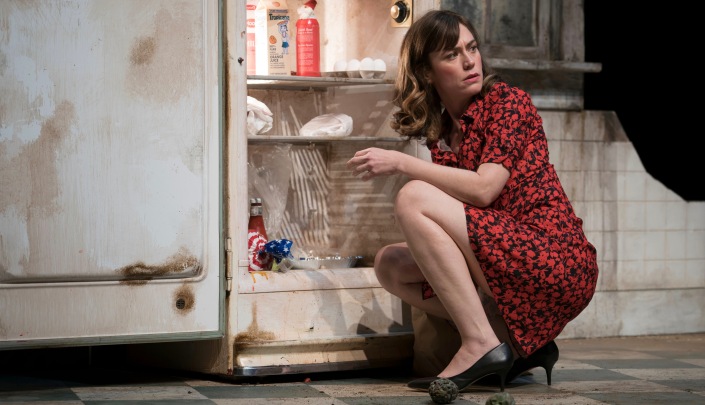
Maggie Siff in Curse of the Starving Class at Signature Theatre. (Photo by Joan Marcus)
DF: Sam Shepard’s Curse of the Starving Class was the first play I directed at Penn, not long after I’d moved from Los Angeles to Philadelphia, and I’ve felt attached to it ever since. Having grown up not far from the (then) expansive California exurbs that are very much Shepard Country, it was a good fit for me—but maybe more important, I feel a strange kinship to Curse’s characters and situations, though they are very far from my own life experience.
CK: Shepard exploded the concept of kitchen-sink realism with Curse, the first work in his now-legendary Family Trilogy. Terry Kinney’s staging for Signature Theatre Company further incinerates the structure—it literally starts with a bang. Before the house lights fully dim, the walls of Julian Crouch’s dingy kitchenette set shatter and suspend, dusting the stage with debris and sending the silverware swinging. It’s a visual coup-de-théâtre, one that had the audience at the performance I saw oohing and ahhing. Yet at the risk of being a downer right off the bat, it struck me as a metaphor for this production’s entire ethos: flashy, fussy, and largely missing the point the playwright wants to make.
DF: Yes, let’s start with that opening. (By the way, I wouldn’t normally think of giving it away, but since Ben Brantley in the New York Times saw fit to lead with it, I guess it’s fair game.) It’s a metaphor for sure, and in theory, I thought it was spot-on: Shepard’s writing certainly does take a naturalistic frame and blow it up into a fragmented, poetic world where the realistic setting remains, but in a profoundly destabilized manner. But in practice, I agree it’s a mistake. The show never recovers from this choice, which—along with Maggie Siff’s first appearance as Ella, her face slathered in cold-cream à la I Love Lucy—sets a tone of grotesquerie.
CK: The play needs to be grounded in naturalism, not alienation and absurdism. Shepard gives us a heightened portrait of a family teetering on the edge of the American Dream—but without a recognizable reference point, that falls flat. What are the stakes if, from the first moment on, we find ourselves watching the Tates enact domesticity from inside a bombed-out crater?
DF: Exactly. The opening explosion removes any sense of normal suburban existence, which Curseabsolutely needs if the satire is to sting as it should. Take the title: when Ella says they’re not rich but they’re not poor—not part of the starving class—it should ring true. The play has much more bite if they are trying to keep up the middle-class illusion, despite everything going wrong around them—Wesley peeing on Emma’s charts, laundry thrown on the kitchen table, a penned-up lamb recovering from maggots. I really wish directors would understand that often their job isn’t to compound what the playwright has already given us.
CK: Kinney is known as a strong Shepard interpreter, both as an actor and director, so his auteurist interpretation surprised me in its wrongheadedness. It struck me as closer to what I’ve come to expect from European directors, who tend to take a one-size-fits-all approach to stories about family dysfunction. Basically, he turns everyone into a scorn-worthy caricature—a collection of funhouse-mirror figures unaware of their own distortion—but he also elides any connection between them. I sensed little shared history among the central quartet, and the performances grow increasingly siloed as the play progresses. Did you share that feeling?
DF: I did. Kinney keeps foundering on this problem—awkwardly wending his way between realism and something more heightened. I actually thought the cast was pretty strong throughout, especially David Warshofsky as Weston. But Kinney, who I thought would be above all an actor’s director, does them no favors individually or collectively. I agree about some of the overly broad acting—but at the other extreme, I don’t think Kinney really understands that Curse is, in a sense, a dark farce: the basic plotline—an estranged wife and husband, each trying to sell the house out from under the other—could almost be Neil Simon. So I would say in a way, it’s a comedy—but not this comedy.
CK: It’s too self-consciously arch. At least that’s how I thought Warshofsky and Siff were directed to play their characters—especially in the early scenes. They settle more suitably into their roles when they invest in presenting a patina of respectability, but it stops short of being entirely successful. On the other end of the spectrum, Lizzy DeClement (Emma) remains a snarling, one-note caricature throughout; and Gilles Geary, though fearless in his physicality, feels oddly muted in the central role of Wesley.
DF: I’d like to have seen this cast with a different director—I really think the ingredients are there, but it doesn’t catch fire. Which is a shame, because forty-plus years after its premiere, Curse really holds up. To my mind, it’s the strongest work in the Family Trilogy, and absolutely belongs in the honor roll of American family drama that includes Long Day’s Journey Into Night, Glass Menagerie, and (oh, alright) Death of a Salesman. It’s the next iteration of the theme, and one with a distinctively Western spin. Curse should be more canonical than it is.
CK: Luckily, we’re going to get a chance to see it again fairly soon, as Philadelphia’s EgoPo Classic Theater prepares to devote its 2019-2020 season to Shepard. And although I question a lot of the choices made in this current production, it reminded me how endlessly fascinating I find Shepard’s work, and how much he still has to tell us about the shape of American life.
Curse of the Starving Class plays through June 2. For more information, visit the Signature Theatre website.